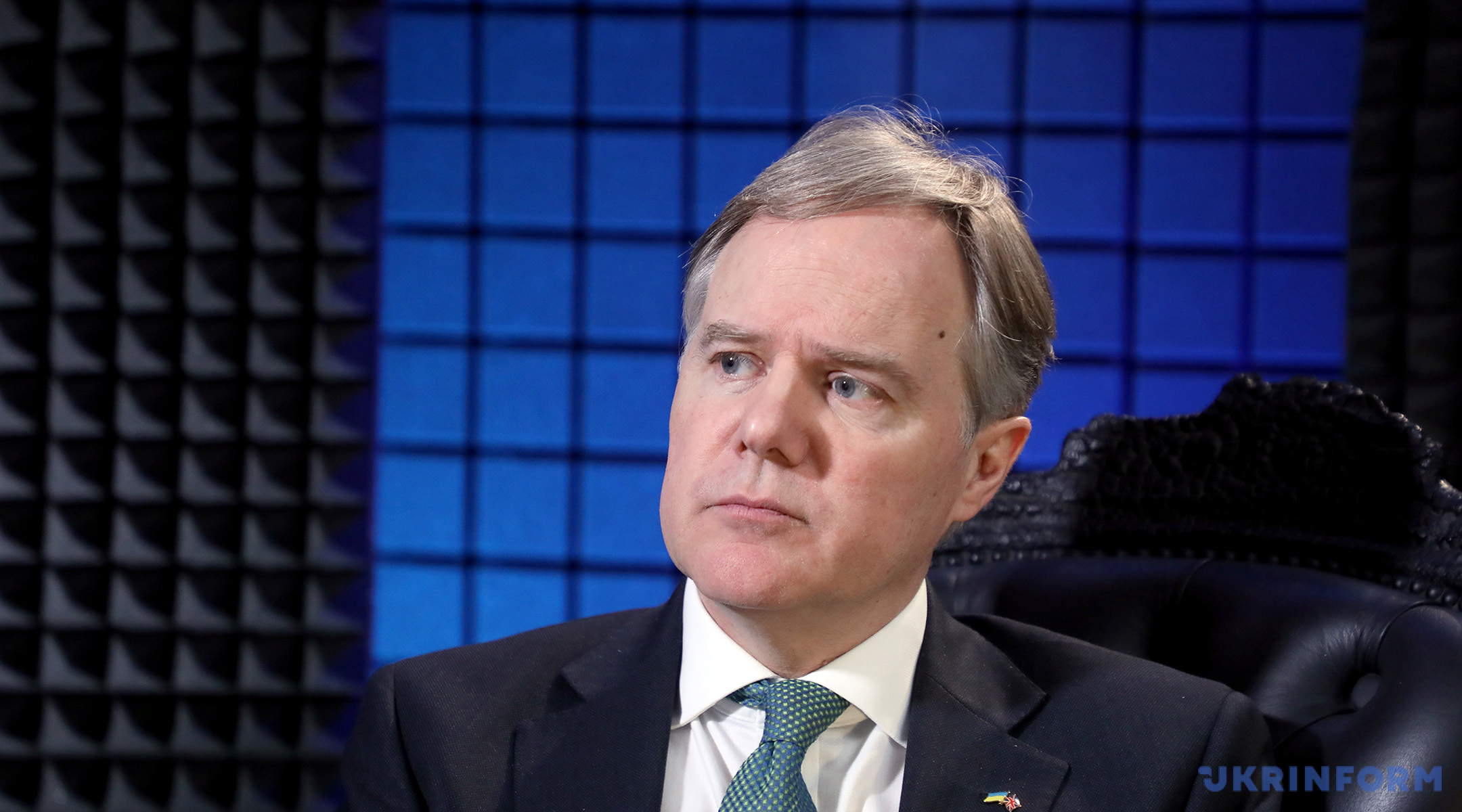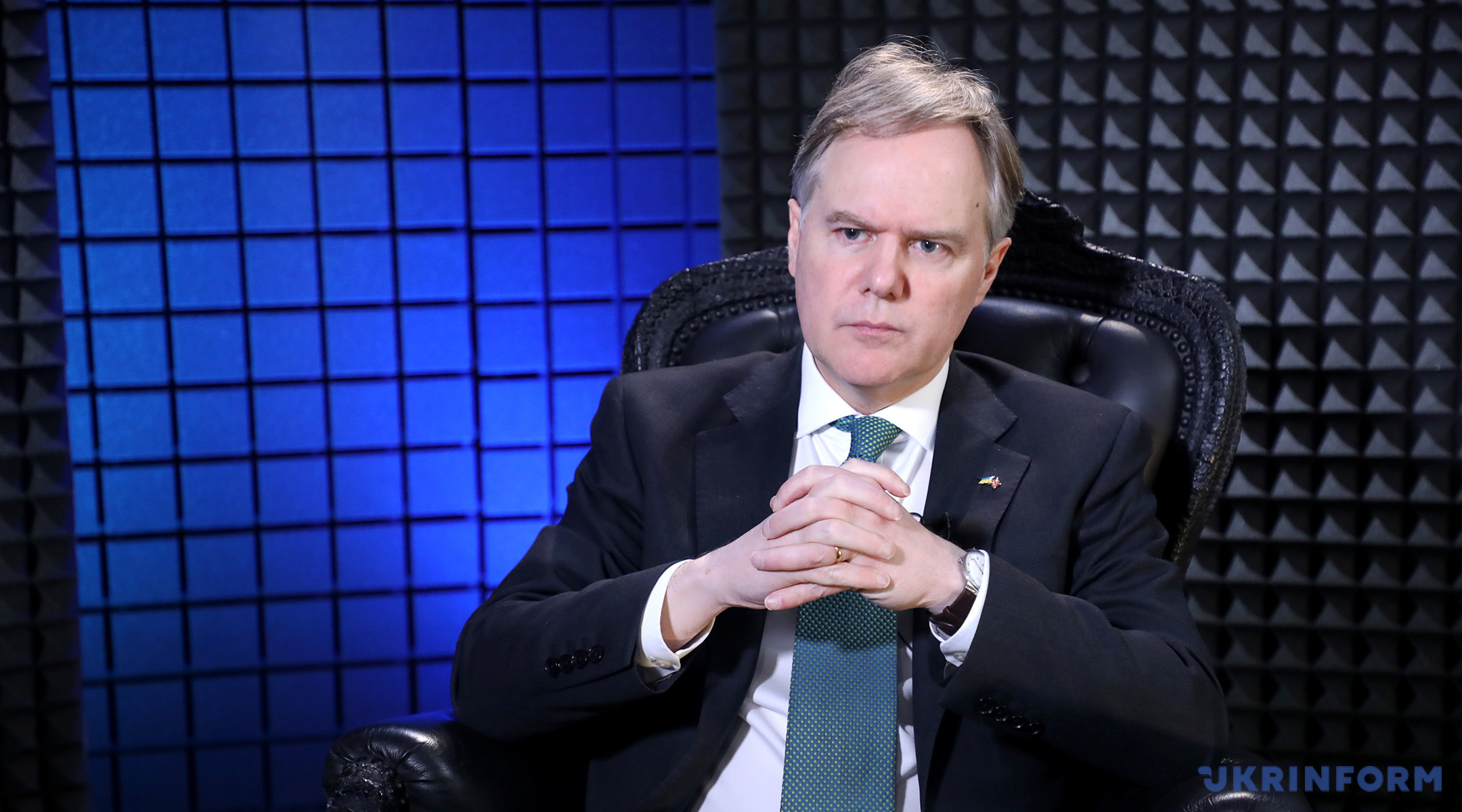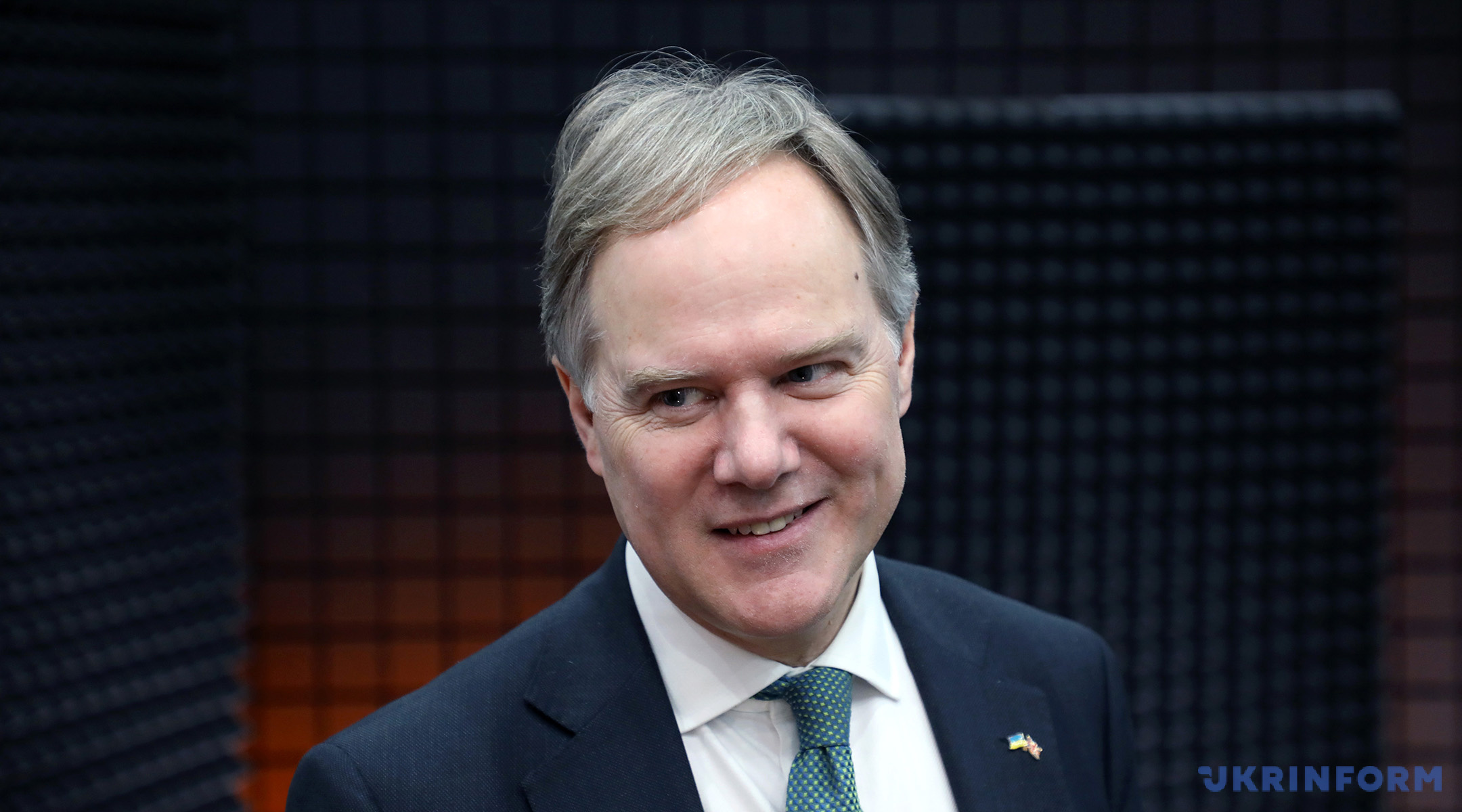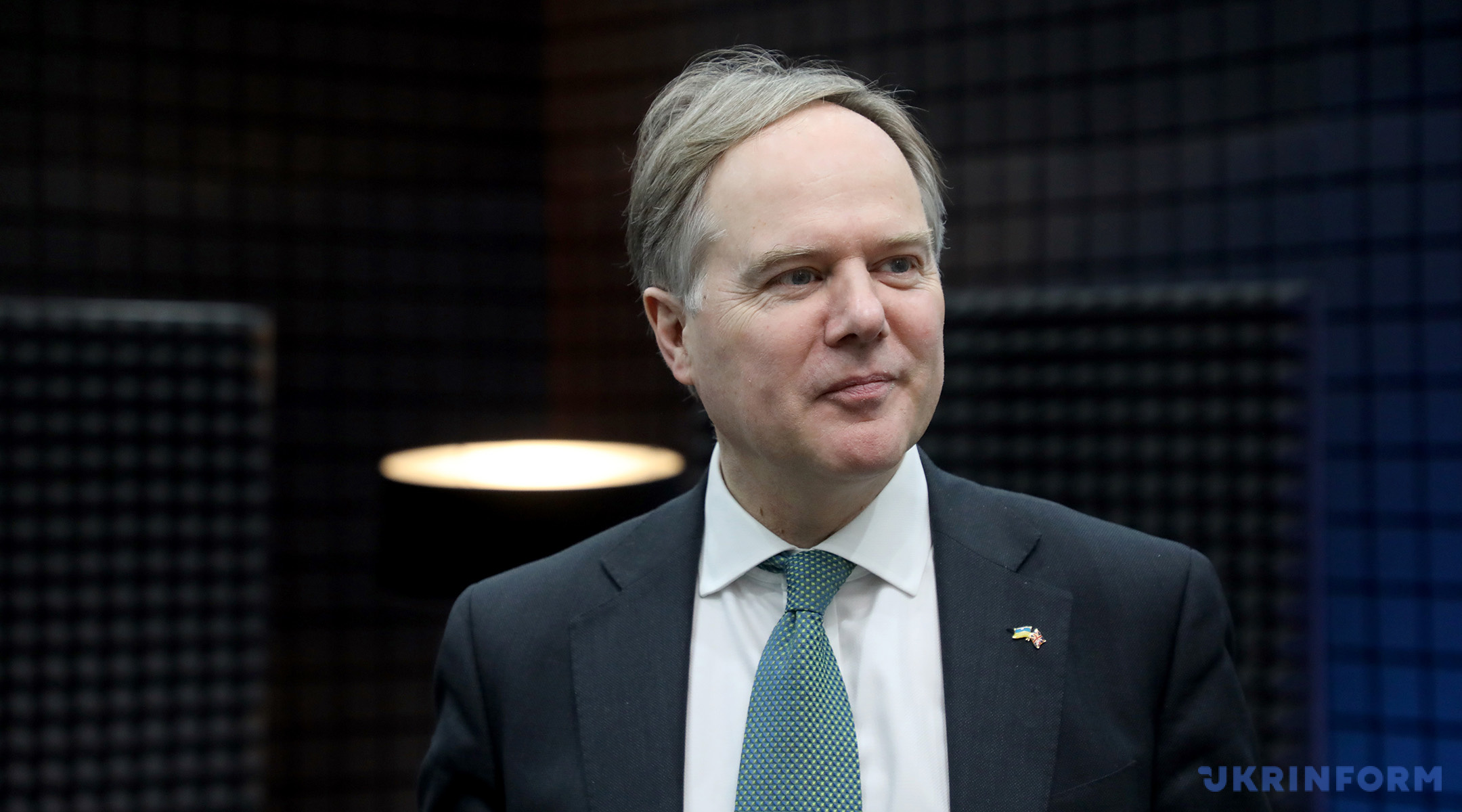The United Kingdom is Ukraine’s long-standing and reliable partner, with which an agreement was signed on January 16, 2025, consolidating these relations for at least the next 100 years. Against the backdrop of noticeable changes in the global geopolitical picture, the pace of development of security risks for Europe, and the lack of clear outlook regarding the resolution of the war, Ukrinform spoke with the Ambassador of the United Kingdom to Ukraine, Martin Harris. How Britain sees the future of Ukraine, what does Russia’s position in negotiations look like, when will a peacekeeping mission be sent to Ukraine, what are the current trends regarding European defence and assistance to Ukraine, what connection do Britons feel with Ukrainians, what special role do displaced Ukrainians play, and what is the true power of culture – Ambassador Harris spoke about these and other things at our Ukrinform studio.

UKRAINE IS DEMONSTRATING WILLINGNESS TO ACHIEVE CEASEFIRE WHILE RUSSIA IS STALLING
- A lot has been happening in the geopolitical arena, around the issue of resolving the war, and we saw the latest round of technical talks in Saudi Arabia was held just recently. Being here in Kyiv, how would you assess what some call “progress” in achieving a ceasefire?
- First of all, I’d like to say that we share President Trump’s desire to stop this barbaric war Russia has been waging against Ukraine immediately. I think it is now absolutely clear that Ukraine seeks a lasting and just peace. That is also our goal. And Ukraine is demonstrating its readiness for an unconditional and full ceasefire. Now the ball is in Russia’s court, Russia must demonstrate practically and realistically whether they are serious about peace. So we are waiting for Russia’s response.
- And by the way, President Trump just recently admitted that Russia might be “dragging their feet” in the ceasefire process. Would you share the opinion that Russia is deliberately delaying the process of settlement while putting forward some demands that are initially unacceptable for Ukraine?
- I think Russia’s reply so far has been inadequate. Ukraine has made clear that it is for a full and unconditional ceasefire right now, President Trump has made clear that there is a real urgency to stop the fighting immediately. And we’ve not heard that from Russia. Russia is talking about conditions, Russia is stalling on the question of stopping the fighting right now. So I think it is really essential that Russia makes clear its position, and if it’s not going to be for peace, we will increase the pressure on Russia and we will continue to support Ukraine until Russia comes to the negotiating table.
ANY CEASEFIRE VIOLATIONS MUST HAVE CONSEQUENCES
- We are all willing to achieve stable ceasefire guarantees here in Ukraine, and one of those guarantees is the deploying an international force in some capacity to monitor the ceasefire, to ensure that Russia doesn’t breach it. And we heard that the UK Special Operations Forces had been put on alert, which may imply that they are getting ready to deploy in Ukraine. Could you confirm that report? Also, what, in your opinion, would be a valid mandate for that international mission? Would, and should, they be allowed to engage Russian forces should they breach the ceasefire agreement?
- I can’t comment on the operations of British forces but let me just develop two different points that you’ve made there. Firstly, there’s one question, which is about how you monitor a ceasefire. And that needs to be given careful consideration to ensure that any violations of a ceasefire have consequences, and that it’s very clear, if there are provocations as we’ve seen before and a ceasefire is broken, who is responsible for those.
What we’re discussing at the moment among a Coalition of the willing is a different element of this, which is how you ensure that Ukraine’s security is strengthened and is provided for in the future so that Russia will not attack again. That is underpinning Ukraine’s security.
And there, there are several elements. One is strong Ukrainian Armed Forces, which is why we’re continuing to train, and equip, and develop Ukraine’s Armed Forces. But the second is whether there can be UK and other troops we’ve made clear that we would deploy them to Ukraine in the event of a peace deal to ensure that you have that element, too, to strengthen Ukraine’s security. And the way in which that will be done is currently under discussion among military planners in the UK and will also be discussed by leaders in Paris on Thursday (March 27 – ed.).

THERE IS A TREND ACROSS EUROPE TOWARD INCREASING ASSISTANCE TO UKRAINE
- Given that there’s willingness to ensure Ukraine’s strength, stronger position at the negotiating table and strength to deter future aggression, on March 19, Foreign Secretary Lammy met with EU’s top diplomat Kaja Kallas to discuss acceleration of military supplies to Ukraine pending the process of achieving ceasefire. As Russia keeps intensifying attacks across the frontline, seeking to seize as much land as possible while a ceasefire is being negotiated, how fast do you believe the UK and EU are ready to act to increase these military supplies to Ukraine?
- We are going to work incredibly quickly on this, in fact we’ve already increased military supplies to Ukraine. You remember that when President Zelensky visited London just recently, he signed an agreement to provide a further $3 billion of support to the military forces of Ukraine, as well as an agreement to provide 5,000 anti-aircraft missiles from the UK. In the past we’ve always provided to Ukraine at least GBP 3 billion in military support, every year, but this year we’re providing over GBP 4 billion because we are increasing the amount of resources that are available for military support. We’re also seeing that from other countries as well. Germany, for example, has agreed to increase its support by EUR 3 billion. And this is part of a general trend across Europe of increasing defence spending and, in that context, increasing support for Ukraine. The UK has agreed to increase its percentage of GDP spent on defence to 2.5 per cent by 2027, that’s a very accelerated time frame. And that will develop additional resources for our defence spending, for our support for Ukraine.
We’re encouraging all of our partners to do the same. And if all European partners in NATO were to increase their percentage of GDP spent on defence to 2.5 per cent, that would be an additional $120 billion of defence spending by NATO countries every year, in other words, the entire Russian defence budget. So there’s a general trend here of Europe, led by the UK, increasing defence spending and, in that context, also providing additional support for Ukraine.
- The UK has traditionally been a major supporter of Ukraine in terms of military supplies. The UK has been pioneering the provision of hi-tech military equipment, including NLAWs, Storm Shadow missiles, Challenger tanks, unmanned systems. We also know that 67 per cent of Britons want Ukraine to prevail in this war. Why do you think, while some countries are now trying to distance themselves from supporting Ukraine, the UK keeps supporting us so much? This is great, but what is the real reason behind this stance?
- I think it’s very simple. We know that the security of the UK begins here in Ukraine. So we understand that the defence of Ukraine is also the defence of Europe, it’s the defence of international law, it’s the defence of the main pillars of security on which the UK depends. So we are not only supporting Ukraine’s security. By doing so, we’re supporting our own security.

WE SEE A FUTURE OF THE UK AND UKRAINE AS FUTURE NATO ALLIES
- One of the pillars of our cooperation is our 100-year Partnership Agreement. How would you assess the current progress of its implementation and what key points would you highlight at the moment? One of the points is that the parties agree to ensure that Ukraine will eventually become a NATO ally, and we see that being part of NATO is probably the best security guarantee for our country. Do you share the same opinion?
- Yes, absolutely. I think we see a future of the UK and Ukraine – two flags here – as future NATO allies, and we see Ukraine as an essential partner for the UK in defending against future threats to Euro-Atlantic security. You’ve spoken of some hi-tech systems that we’ve provided to Ukraine but what we’ve also seen is the hi-tech systems that Ukraine itself is developing. And increasingly, we’re seeing British defence companies engaging with their Ukrainian counterparts because we see a common interest in developing those capabilities together and using them in the future to defend the security of Europe.
- While I say that being a member of NATO is the best security guarantee for Ukraine, how would assess the reports that the U.S. administration is exploring the idea of withdrawing from commanding NATO forces in Europe? Do you think that might be a harbinger of the U.S. actually pulling from the collective security idea? Could this be a threat to unity within NATO?
- No, I don’t think so at all. I think that the U.S. administration and Defence Secretary Pete Hegseth have said very clearly that the U.S. is committed to the Euro-Atlantic Alliance and there should be no question about that. I think the United States is saying – correctly – that, as we develop the Alliance further, there needs to be a greater contribution from European allies. And, as I say, UK is taking a lead on that in increasing defence spending itself and encouraging other countries to do the same.
- Another issue in which the UK might be the nation, along with France, to take the lead, is nuclear deterrence. We know that the Russian nuclear threat is out there. We’re not underestimating it while not overestimating it either. Do you think your nations could play a key role in nuclear deterrence in Europe?
- I think we continue to consider that the foundation of security in Europe is NATO. It’s the Euro-Atlantic Alliance. So we are working very closely with our U.S. counterparts on all those key issues of Euro-Atlantic security, including the issues of bringing a lasting peace to Ukraine because it’s an essential element of Euro-Atlantic security for the future.

UKRAINIANS IN THE UK ARE AMBASSADORS FOR THEIR COUNTRY
- Now a practical question from bilateral relations. Ukrainian President Volodymyr Zelensky has extended visa-free travel for British nationals until January 30, 2026. The UK is gradually simplifying visa procedures for the Ukrainians, but a full visa-free travel between the two countries is yet to be put in place. Is the issue on the table in the UK? If not, can we expect it to be brought up anytime soon?
- First of all, we continue to work on improving the services for getting visas for the UK. We have a visa application center here in Kyiv, which is now able to both take in applications and to provide visas directly here in Kyiv. Previously, they had to be issued in Warsaw but we improved the situation in recent months.
And there’s a provision in the agreement that we’ve reached on a 100-year Partnership for further talks on this issue between officials. So those talks will be getting underway and we will be able to explore how we can improve things further. And of course, we’ve provided a couple of hundred thousand visas to Ukrainians to be able to come to the UK under the Homes for Ukrainians scheme since the start of the full-scale invasion. And it’s great that many Ukrainians have been welcomed into people’s homes in the UK and been able to find safety since the war began.
- Do you believe they are integrating well into British society?
- I think that many of them are looking for an opportunity to come home and I very much hope they will have that opportunity soon, which is why it’s so important that we work urgently on an end to the conflict. But I also see that they both are making their contribution to life in the UK and are themselves the Ambassadors for Ukraine in the UK. Because so many people in Britain maybe did not know about Ukraine before, but now they do. They know the Ukrainians personally, and that gives them a really strong personal connection to Ukraine, to Ukraine’s defence and what’s happening here. One of the reasons I think there’s so much support for Ukraine in the UK is because of that connection that people now have personally through the Ukrainians, who’ve come to the UK and whom they’ve come to know.
UKRAINE IS NOW A THING IN BRITAIN
- Let’s switch back to Ukrainian if you don’t mind. I would just like to dwell on this question. You know Ukraine, our culture and traditions. You worked here in the Embassy in 2003-2008 before you took the helm in 2023. What do you think could be the ways we could better convey to the world our Ukraine case, the idea of what Ukraine is? How should we explain to the world that Ukraine is not Russia?
- I think that now is a very important moment to share Ukrainian culture, Ukrainian traditions with people around the world. As I said, I think now people know about Ukraine. Thanks to the courage of Ukraine’s defenders, they know that Ukraine is not Russia. That Russia is an aggressor. And that Ukraine protects the security of Europe. And they also know Ukrainians on a personal level. And this is an important moment. There is great interest in Ukraine – both in Britain and in other countries. Ukraine has become a thing in the UK. For example, my daughter is now a student at Cambridge. And now all students there have the opportunity to study foreign languages, being offered two options – Spanish or Ukrainian. So imagine what opportunities students now have to learn about Ukrainian culture, Ukrainian language. I think Ukraine should seize this chance.

WAR INFLUENCES THE CREATION OF A NATIONAL NARRATIVE
- I guess it’s partly because there are certain parallels between Ukraine’s current fight and the one Britons had, among others, during World War 2. Ukrainians are aware of a British series called Foyle’s War, where the stories of average people in Britain are shown so well, their moral dilemmas amid the war when it’s unclear for how long it will last, so we see certain similarities. What parallels do you see here?
- There are many parallels here. For example, I think that, when Britons heard the sirens going off in Kyiv, everyone remembered the sirens people heard in London back in the day. Also, the war is a moment that greatly influences the creation of national traditions, a national narrative – both back then for Britain and now for Ukraine. Also, of course, for us it was a moment to defend our freedom, and now for Ukraine it is also a moment to defend yours.
- How did your people address war fatigue as the Germans were bombarding cities for eight months straight?
- I think it’s about the resilience of the British people. We also remember that during the air raids, people would hide in underground shelters on The Tube. And when we see a similar situation in which Ukrainians found themselves, to us it means that we share the same experience. This testifies to both the suffering and the resilience of the Ukrainian people, and that’s something that our people showed during World War II.
- As you see, life in Ukraine goes on, and not all Ukrainian cities, apparently, have been wiped out. We have a thriving art life, too. I know you go to theatres often, that you like to go to various concerts. Perhaps you have any particular Ukrainian song that warms your heart or maybe the one you perform for your friends?
- I know that you are seeing a real theatrical boom. I often go to theatres, and I noticed that theatre is very popular, that plays are sold out. You have brilliant artists, directors, actors. I was at the opening of the First All-Ukrainian Shakespeare Festival in Ivano-Frankivsk. This is a terrible war, but it also contributes to Ukraine’s revival.
I really love music, especially church music, but also modern pieces. I know Kozak System, Okean Elzy, and Pikkardiiska Tertsia… These are the bands that I remember from 20 years ago when I was here. I have plenty of favourite songs. We also created a choir at our Embassy, and on Christmas Eve we performed a carol. It was a really beautiful and low-profile carol from the Carpathians. In this way, we also learned and tried to understand Ukrainian traditions.
- I heard that one, by the way. That was amazing. Let’s hope that we have more occasions to celebrate. Not only to use art as a form of resilience, a form of staying sane, but also to actually celebrate the good things in our lives. Let’s hope that the joint efforts by Ukraine and the international community will bring fruit, will help us achieve a ceasefire that is stable and that can lead to a just and lasting peace.
- I agree. I think it’s a key part of our 100-year Partnership. We are working on technology, we are working on education, we are working on security issues, but we’re also working on culture. Because culture is bringing our two countries together. Last Friday, we had a major music festival, in the Royal Albert Hall in London, of military music, with the Royal Marines Band, which is our pride and joy. And for the first time on Friday, they performed with the Ukrainian military musicians. So that was a great expression not only of our security partnership but also of how we are sharing our culture together. Because Ukraine and the UK are especially close today and we will be in the future, and for the next century.
Ievgen Matiushenko, Kyiv
Photo: Yulia Ovsiannikova
